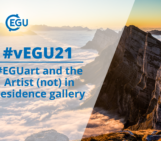
Whether you spend a lot of time interacting in digital spaces, or this is your first time, #vEGU21 is bound to be an interesting experiment for us all. Many Networking and Session conveners will be learning right along with you and our conference organiser Copernicus has been busy preparing as much as possible to make sure that all our participants have the best experience over the next two weeks.
There are plenty of options for abstract authors and others to participate, whether that is through commenting on uploaded Display materials, participating in the live vPICO sessions and text chats, watching one of the ten live-streamed Union Symposia or Great Debates, or setting aside time to join one of our many short courses. When you add to that the many virtual networking events, like ECS meet-ups, as well as some fun options like the Imaggeo photo competition and a #DataHelpDesk, it becomes clear that there is a lot going on and a lot to try!
To help you get the most out of this week, we have selected the following ‘Top 10 Tips’ for getting the most out of your online interactions during vEGU21. And if you have any additional tips or advice, please add them in the comments below.
Top 10 tips for participants to get the most out of #vEGU21:
- Share your science! If you submitted an abstract, make sure to upload Display materials to your abstract to stimulate interactions with your colleagues. There are lots of choices of format so pick the one you think works best for you.
- Plan your week. The week of the EGU General Assembly is always a marathon, and #vEGU21 will be especially so as we have spread the virtual events over two weeks, so it’s best to use the personal programme function on the website to help you plan out your favourite talks, courses and sessions so you don’t miss anything.
- Know what to expect. There are many ways to engage during #vEGU21, from commenting on Display materials and participating in the live vPICO sessions, to the #vEGU21 Union Symposia and Great Debates. So it’s a good idea to check our online guides ahead of time to find out the best way to experience each one.
- Read the Display material before the session! If you decide to participate in any of the scientific sessions, it’s a great idea to check out the session materials ahead of time, and prepare a few questions for the author. This will REALLY help the session organizers and conveners who have been hard at work for the last few months to bring you some exciting science!
- Find your people! Community is one of the key things that makes EGU really special. Even though we aren’t meeting in person, you can still enjoy spending time with colleagues and friends from around the world. Use Division specific networking events, the vEGU21 Networker tool and social media to find each other online, or try one of the special pop-up networking events!
- Good behaviour is expected. We know that within a community as diverse as ours, everyone needs to work together to make sure #vEGU21 is a safe space for all who want to participate. So if you become concerned about any behaviour that violates the EGU Code of Conduct, please let us know.
- Ask for help. This week will include a lot of new experiences, for EGU and for all our members and event participants. There may well be some things that don’t work the way we expect them to, or challenges that we don’t yet know exist, so if you need help during the week, please reach out to us, Copernicus or your convener.
- Take a break. Engaging with others online can be exhausting! One of the big benefits of #vEGU21 is that a large amount of the material shared, either live events or display materials from the vPICOs, will be available on-demand to registered attendees during the two weeks of the meeting – so be gentle with yourself and take breaks as you need them. Perhaps check out our EGU Calm Room, if you need to.
- Constructive commenting is key. We all know that the best science comes from the sharing and rigorous testing of ideas, but it is can be easier to misinterpret people’s intentions online. So when commenting, please try to make sure that you are constructive, supportive and, most importantly, kind!
- Have fun! We want every person who participates in #vEGU21 to get something positive out of it. 2021 remains a challenging time for many people, and so we want to encourage you to try and have some fun together as we gather together online for this great adventure!
Worried about abusive behaviour?
Abusive behaviour (trolling, harassment and, in general, not following the EGU’s Code of Conduct) WILL NOT BE TOLERATED on our platforms. More information on the procedures for reporting and removal of those who do not follow these guidelines will be available in the week prior to Sharing Geoscience Online on the www.egu21.eu website.
If you are still feeling uncertain, why not check out something with a somewhat similar format like twitter chats! These are large, open access chats hosted in the open platform of Twitter and focussed around a central idea or speaker. It can be a good way of picking up some methods of interacting online in this way and still having fun.
We are so much looking forward to gathering with all of you online, discussing your research in an open and constructive way.




